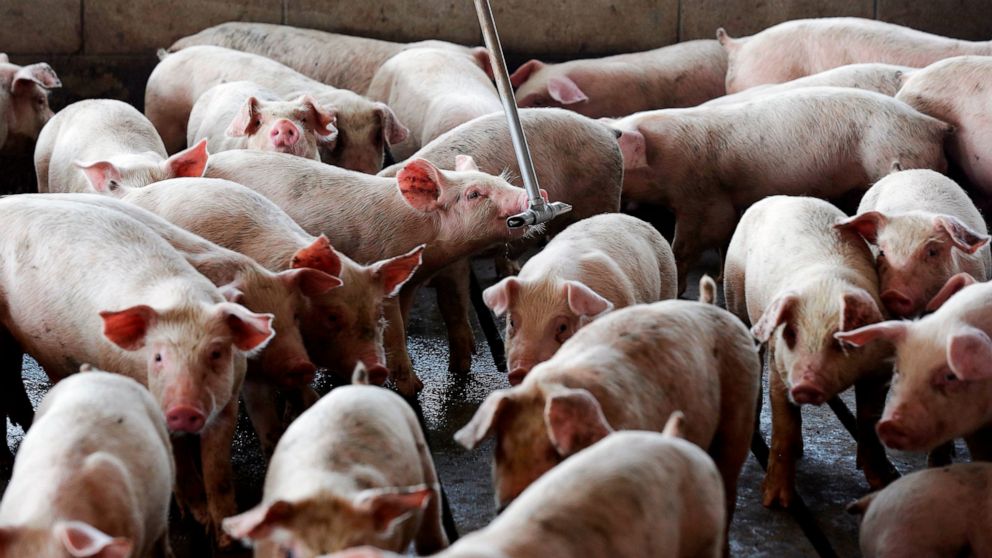Court upholds nuisance verdicts against hog-production giant
An appeals court has upheld a 2018 jury verdict that led to monetary awards for neighbors of an eastern North Carolina industrial hog operation for its smells and noise
RALEIGH, N.C. — A federal appeals court on Thursday upheld a 2018 jury verdict that led to awarding monetary damages to neighbors of a North Carolina industrial hog operation for smells and noise they said made living nearby unbearable.
But judges ruled the jurors’ massive multimillion-dollar awards — intended to penalize a subsidiary of the world’s largest pork producer for wrongdoing — were unfairly weighed against the producer’s corporate assets and must be reconsidered. The decision by the 4th U.S. Circuit Court of Appeals in Richmond, Virginia, could affect similar nuisance cases filed by North Carolina rural residents already on appeal that went against Smithfield Foods or haven’t gone to trial.
A majority on the three-judge panel rejected the arguments of attorneys for Murphy-Brown LLC that a new trial should be ordered. Murphy-Brown is a subsidiary of Smithfield, which in turn is owned by Hong Kong-based WH Group Limited.
The jurors found the company liable for the nuisance conditions at a Bladen County farm in eastern North Carolina that raised 15,000 hogs annually for the company and disposed of massive amounts of feces and urine there. The neighbors of Kinlaw Farms had filed suit, complaining they had suffered for years from intense, putrid smells coming from open-air hog waste lagoons. They alleged that Smithfield Foods refused to spend money on technology that could address these problems.
The jurors declared Murphy-Brown interfered with the enjoyment of the residents’ property. The 10 neighbors received a total of $750,000 in compensation, plus $50 million in damages designed to punish Smithfield and WH Group. North Carolina state law forced U.S. District Judge Earl Britt to cut the punitive damages to $2.5 million.
Writing the prevailing opinion, U.S. Circuit Judge Stephanie Thacker rejected several arguments from Smithfield’s lawyers where they said Britt erred, including whether the issue of punitive damages should even have been put to the jury.
Thacker said there was ample evidence for jurors to conclude the company “persisted in its chosen farming practices despite its knowledge of the harms to its neighbors.” She mentioned piles of hog carcasses in dumpsters on the farm, extensive summer spraying of hog waste from lagoons onto fields, and trucks running at all hours. Smithfield ultimately removed its hogs from Kinlaw Farms.
It was appropriate for jurors to consider the large bank accounts annd executives’ salaries at Smithfield and WH Group in determining whether it could have paid to improve technology and other conditions at Kinlaw Farms, Thacker wrote. But she said it was wrong for Britt to allow jurors to consider the same information in determining the size of punitive damages, citing “the particular ability of potentially inflammatory evidence to sway a jury’s calculation.” The court vacated the punitive award and will return the case to the trial court to determine appropriate damages.
An attorney representing the plaintiffs and a spokesperson for Smithfield didn’t immediately respond to requests for comment on Thursday.
Circuit Judge G. Steven Agee wrote separately to say he would have given Murphy-Brown a new trial. The plaintiffs, Agee wrote, used “overtly irrelevant, prejudicial and unreliable evidence” that made the verdict invalid.
The case was the first that went to trial among dozens of lawsuits filed by more than 500 neighbors complaining about hog operations. A handful that went to trial went against Smithfield, leading to hundreds of millions of dollars in punitive damages that were later reduced.
Early litigation losses led the state legislature to approve a law that placed tougher restrictions upon neighbors of hog farms seeking to sue for damages.
Smithfield Foods hasn’t changed the dominant method of hog waste disposal since intensive hog operations multiplied in North Carolina in the 1980s and ’90s. The practice involves housing thousands of hogs together, flushing their waste into holding pits, allowing bacteria to break down the material, which is ultimately sprayed onto fields.
Circuit Judge J. Harvie Wilkinson agreed with Thacker’s opinion, but wrote his own, saying poor conditions at industrial hog operations contribute to poor conditions for humans living nearby. The problems were unlikely to have persisted or arisen at all had the Kinlaw Farms neighbors been wealthier or more politically powerful, he wrote.
“It is past time to acknowledge the full harms that the unreformed practices of hog farming are inflicting,” he wrote.
![]()


